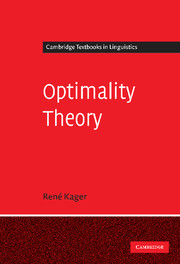Book contents
- Frontmatter
- Contents
- Preface
- 1 Conflicts in grammars
- 2 The typology of structural changes
- 3 Syllable structure and economy
- 4 Metrical structure and parallelism
- 5 Correspondence in reduplication
- 6 Output-to-output correspondence
- 7 Learning OT grammars
- 8 Extensions to syntax
- 9 Residual issues
- References
- Index of languages
- Index of subjects
- Index of constraints
8 - Extensions to syntax
Published online by Cambridge University Press: 05 June 2012
- Frontmatter
- Contents
- Preface
- 1 Conflicts in grammars
- 2 The typology of structural changes
- 3 Syllable structure and economy
- 4 Metrical structure and parallelism
- 5 Correspondence in reduplication
- 6 Output-to-output correspondence
- 7 Learning OT grammars
- 8 Extensions to syntax
- 9 Residual issues
- References
- Index of languages
- Index of subjects
- Index of constraints
Summary
Introduction
In this chapter we will look into results of OT in the domain of syntax. It is important to emphasize once again that OT is not a theory of phonology proper, but rather a theory of grammar. Therefore the basic idea underlying OT, that of hierarchically ranked constraints which are minimally violated, is, in principle, equally well applicable to non-phonological phenomena. The present chapter should be read as an attempt at such an extension of OT into syntax, an attempt mainly based on a recent paper on English auxiliaries by Grimshaw (1997). We will discuss the syntactic counterparts of constraint types which we have seen active in previous chapters, and will elaborate the OT architecture of faithfulness and well-formedness constraints. Besides defining constraints in the domain of syntax, we will also address the nature of the input in syntax, and the definition of the function of Gen. These are non-trivial matters, that merit discussion in their own right. Finally we will develop the factorial typology of the core syntactic constraints of Grimshaw's paper.
OT and syntax
How could OT contribute to a better understanding of syntactic phenomena? Let us first point out some dimensions along which recent ‘Minimalist’ syntactic theory and OT-based syntax differ, as well as some aspects in which they are surprisingly similar. (See Radford 1997 for an overview of minimalism in syntax.)
- Type
- Chapter
- Information
- Optimality Theory , pp. 341 - 371Publisher: Cambridge University PressPrint publication year: 1999

